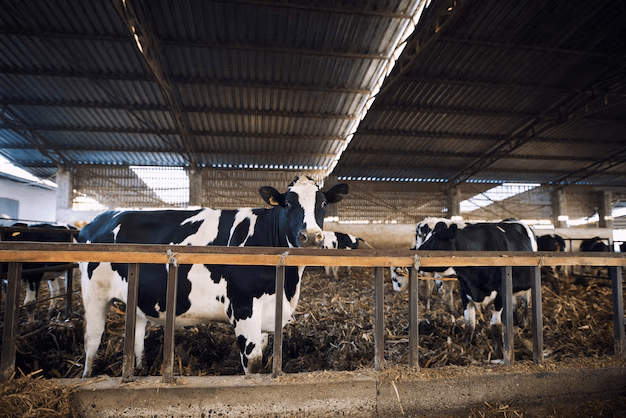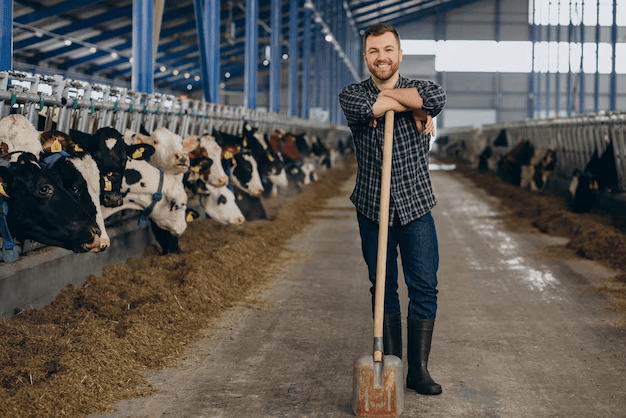Introduction
Dairy farming is a vital industry that provides essential nutrition to millions. However, improper waste management can lead to environmental pollution, reduced farm productivity, and increased costs. Implementing an efficient waste management system can enhance sustainability, improve dairy farm efficiency, and boost profitability. Delmer manufactures state-of-the-art scrapers using high-quality galvanised metal entirely in-house. Equipped with either nylon or steel wire rope, these Manure scrapers facilitate efficient stable cleaning while ensuring the safety of personnel working in the shed.

The Importance of Waste Management in Dairy Farming

Dairy farms generate various types of waste, including manure, wastewater, and feed leftovers. If not managed properly, these waste materials can cause health hazards, contaminate water sources, and contribute to greenhouse gas emissions. Effective waste management can:
Enhance Soil Fertility: Manure can be converted into organic fertiliser, enriching the soil and improving crop yields.
Reduce Environmental Impact: Proper disposal methods prevent water and air pollution.
Improve Animal Health: Clean farm surroundings reduce the risk of diseases among livestock.
Increase Operational Efficiency: Recycling waste can lead to cost savings and improved resource utilization.
Best Waste Management Practices for Dairy Farms
-
Manure Management and Composting: Manure is a valuable resource when managed efficiently. Dairy farmers can use composting techniques to convert manure into organic fertiliser. Composting helps in:
-
Breaking down harmful pathogens
-
Reducing odour and flies
-
Enhancing soil fertility for better crop production
-
2. Biogas Production from Dairy Waste: Installing a biogas plant allows dairy farms to convert manure and organic waste into renewable energy. The benefits include:
-
-
Reducing dependency on fossil fuels
-
Generating electricity for farm operations
-
Producing nutrient-rich slurry for soil enhancement
-
-
Efficient Water Recycling: Dairy farms require a significant amount of water for cleaning and animal hydration. Implementing water recycling techniques can:
-
Reduce water wastage
-
Lower utility costs
-
Ensure sustainable water usage
-
-
Utilizing Wastewater Treatment Systems: Wastewater from dairy farms often contains harmful chemicals and organic matter. Installing a wastewater treatment system helps in:
-
Removing contaminants before discharge
-
Reusing treated water for irrigation or cleaning
-
Complying with environmental regulations
-
-
Reducing Feed Waste: Optimizing feed management can prevent wastage and lower costs. Strategies include:
-
Proper storage of feed to prevent spoilage
-
Using feed formulation techniques to ensure balanced nutrition
-
Recycling unused feed through composting or biogas production
-
Benefits of Waste Management in Dairy Farming

Are you searching for a powerful and safe solution to protect your precious cattle, buffaloes, sheep, goats, and other furry friends from pesky ticks, mites, lice, and flies? Look no further! Delmer’s Fly Out is the perfect answer to all your animal care worries.
By implementing effective waste management practices, dairy farmers can experience several benefits:
Cost Savings: Reduced waste disposal expenses and improved resource efficiency.
Environmental Sustainability: Lower carbon footprint and reduced pollution.
Improved Productivity: Healthier livestock and better farm hygiene.
Compliance with Regulations: Meeting government waste disposal standards to avoid penalties.
Conclusion
Efficient waste management is essential for modern dairy farming. By adopting sustainable practices such as composting, biogas production, water recycling, and feed optimization, dairy farmers can improve farm efficiency, reduce environmental impact, and boost profitability. Investing in waste management solutions not only benefits the farm but also contributes to a greener and more sustainable dairy industry.

